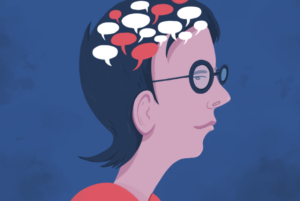In this piece for STAT, Shirley S. Wang discusses the Hearing Voices Network and its non-pathologizing, rights-affirming approach to hearing voices and alternative realities.
“Many recovered voice hearers say that once they engage with the voices, their mental health improves — and the voices become nicer as well.
Since going off her medications, for instance, Waddingham has been able to take on demanding full-time jobs, such as serving as a past project manager at a nonprofit mental health advocacy organization. And she’s gotten married.
Now 39, she lives in Faversham, England, about 50 miles east of London, works as a therapist, and gives speeches about voice hearing and recovery strategies around the country. She’s also writing a book and applying for Ph.D. programs.
She hears more voices than ever — about 13 at the moment, she estimates. And they continue to tell her to hurt herself or others. Waddingham acknowledges that hearing the voices ‘can be difficult.’ She still has days when it’s hard to cope and she needs to sit home alone and pull a blanket around her. Still, she chooses not to use medication — even though the drugs did reduce the number of voices she heard.”















